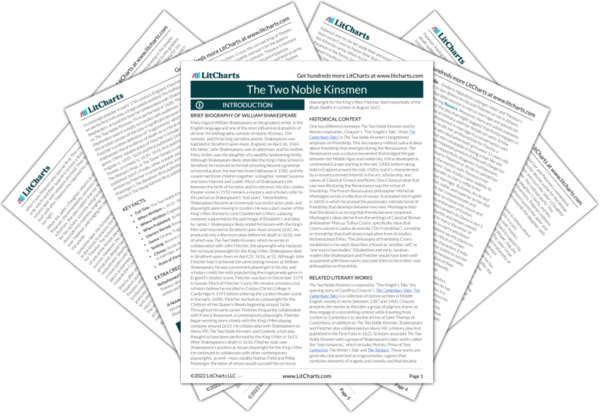One of The Two Noble Kinsmen’s most significant departures from Chaucer’s “The Knight’s Tale” is its heightened emphasis on friendship. The play establishes three primary pairs of close friends in its opening scenes: Theseus and Pirithous, Emilia and Flavina, and Arcite and Palamon, each of which depicts an intimate bond. These friendships are largely defined by shared respect or affection, and this creates a certain equality in the relationships. Arcite and Palamon (when they are not feuding) address each other as “noble cousin,” “gentle cousin,” “fair cousin,” and “noble kinsman.” What’s more, Arcite’s clever, rational personality complements Palamon’s more loving, impassioned demeanor, thus leading to a well-balanced connection. After the Athenians capture and imprison Palamon and Arcite at the beginning of the play, the friends go so far as to express gratitude for their imprisonment, since it ensures they will always have the other by their side. Arcite refers to their cell as a “holy sanctuary,” and Palamon expresses gratitude that “[their] fortunes / Were twined together.” The implication here is that it’s possible to take refuge in friendship, which can sustain people through times of hardship. To that end, Hippolyta recounts the battles and hardships Theseus and Pirithous have endured together and describes their friendship as a “knot of love” that is so “entangled” that it could never be “undone.” In a way, then, The Two Noble Kinsmen presents the love between friends as the ideal form of closeness that two people can achieve, a deeply unified existence split between two sympathetic individuals. Whereas the play characterizes romantic love as irrational, chaotic, and discordant, this bond of platonic friendship embodies stability, unity, and harmony. Indeed, the play’s tragic ending illustrates the importance of friendship over other forms of love, as Arcite and Palamon’s misguided efforts to attain the romantic love of Emilia cause them to lose a much greater love: that of a good friend.
Friendship ThemeTracker

Friendship Quotes in The Two Noble Kinsmen
Their knot of love,
Tied, weaved, entangled, with so true, so long,
And with a finger of so deep a cunning,
May be outworn, never undone. I think
Theseus cannot be umpire to himself,
Cleaving his conscience into twin and doing
Each side like justice, which he loves best.
You’re out of breath,
And this high-speeded pace is but to say
That you shall never—like the maid Flavina—
Love any that’s called man.
Nay, most likely, for they are noble suff’rers.
I marvel how they would have looked had they
been victors, that with such a constant nobility enforce
a freedom out of bondage, making misery
their mirth and affliction a toy to jest at.
Yet, cousin,
Even from the bottom of these miseries,
From all that fortune can inflict upon us,
I see two comforts rising, two mere blessings,
If the gods please: to hold here a brave patience,
And the enjoying of our griefs together.
Whilst Palamon is with me, let me perish
If I think this our prison!
Men are mad things.
It is the very emblem of a maid.
For when the west wind courts her gently,
How modestly she blows and paints the sun
With her chaste blushes! When the north comes near her,
Rude and impatient, then, like chastity,
She locks her beauties in her bud again,
And leave him to base briers.
Have I called thee friend?
I shall live
To knock thy brains out[.]
Here, Palamon. This hand shall never more
Come near thee with such friendship.
I’ll be cut a-pieces
Before I take this oath!
No, never duke. ’Tis worse to me than begging
To take my life so basely; though I think
I shall never enjoy her, yet I’ll preserve
The honor of affection, and die for her,
Make death a devil!
What sins have I committed, chaste Diana,
That my unspotted youth must now be soiled
With blood of princes, and my chastity
Be made the altar where the lives of lovers—
Two greater and two better never yet
Made mothers joy—must be the sacrifice
To my unhappy beauty?
’Tis pity love should be so tyrannous.—
O, my soft-hearted sister, what think you?
Weep not till they weep blood. Wench, it must be.
Poor wench, go weep, for whosoever wins
Loses a noble cousin for thy sins.
Hail, sovereign queen of secrets, who hast power
To call the fiercest tyrant from his rage
And weep unto a girl[.]
Is this winning?
O all you heavenly powers, where is your mercy?
But that your wills have said it must be so,
And charge me live to comfort this unfriended,
This miserable prince, that cuts away
a life more worthy from him than all women,
I should and would die too.
Infinite pity
That four such eyes should be so fixed on one
That two must needs be blind for ‘t.













